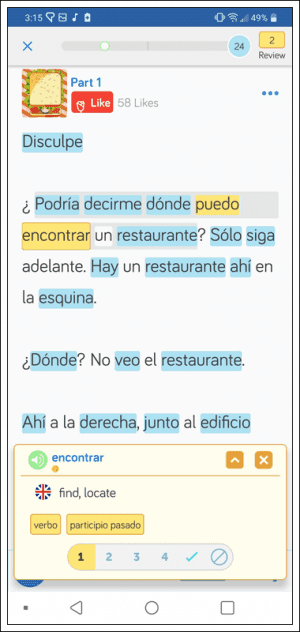Spanish Adverbs for Everyday Use
Why are Spanish adverbs so important in conversations and writing?
Adverbs are powerful words that help us find out when, how, where, how often, or to what degree something happens. For example, meeting up with a friend “aqui” or “here” would be much different than meeting them “alla” or “there”. Meeting up with a friend “ahora” or “now” would be different than “luego” or “later.” So now you can see that without a basic knowledge of Spanish adverbs, you can be quite left quite puzzled!
A trick to uncover Spanish adverbs
Almost any Spanish word that ends in “-mente” is an adverb. For example, “frequentemente/often” and “posiblemente/possibly” are examples of two adverbs. Use this method to spot adverbs in your reading or catch them in conversation. These words can be used to help describe to what extent an action is being performed, and lead to an overall better understanding of the topic.
Check out some examples of adverbs with “-mente” being used in a sentence.
Terminaron el examen rápidamente.
They finished the exam quickly.
Los ninos jugaron alegremente.
The children played happily.
Comí el almuerzo lentamente.
I ate lunch quickly.
However, not all adverbs end in “-mente.” In fact, here are some adverbs you have probably already learned, such as, “poco/ little” and“mucho/a lot”. Check out the following common adverbs in this example conversation.
Anna: “Hola, ¿como estas?”
Anna: “Hello, how are you?”
Maria: “Estoy mal, recibi los resultados de mi examen de matemáticas, y hice peor de lo que yo estaba pensando.”
Maria: “I’m not well, I received my mathematics exam results and I did worse than I thought.”
Anna: “Lo siento Maria. Pero no te preocupes. Eso pasa a veces, en el próximo examen, ganaras un calificación mejor.”
Anna: “I’m sorry Mary, Don’t worry, that happens sometimes, on the next exam, you will get a better score.”
In this example, we see some adverbs of quality, such as “mal/bad”, “peor/worse” and “mejor/better”. There is also an adverb of time “a veces/sometimes” These words help us understand how Maria is feeling, and how Anna is able to provide some reassurance. Check out another example, and see how Adverbs are shaping our understanding in this conversation.
Carlos: “¿Cuando quieres ir al cine?”
Carlos: “When do you want to go to the cinema?”
Derek: “Me gustaria ir pronto, ¿y tu?
Derek: “I’d like to go soon, and you?”
Carlos: “Posiblemente puedo ir mañana. Tanto que deseo ir hoy pero, no tengo dinero. Mañana me van a pagar y podemos ir allá.
Carlos: “I can possibly go tomorrow. As much as I want to go today, but I don’t have money. Tomorrow they are going to pay me and we can go there.”
Derek: “Perfecto ¿Quieres reunirte allá o aquí en mi casa mañana?”
Derek: “Perfect. Want to meet up there, or here at my house tomorrow?”
Carlos: “Vamos a reunirnos aquí en tu casa media hora antes de ir al cine.”
Carlos: “We are going to meet up here at your house a half hour before we go to the cinema.”
As previously mentioned, it’s important to know that by saying “Aqui/here” that Carlos is letting Derek know that he is going to stop by his house on the way to the Cinema. This helps Derek understand where he will meet up with his friend.
Protip: Learn Spanish adverbs in context

Learning in context helps you get a better understanding how adverbs are used and it will also help you understand how sentences are structured (ie: grammar).
LingQ has 100s of easy-to-follow Spanish mini-stories to help you read, listen, and save adverbs (and any other vocabulary you come across) all in one platform. LingQ’s text-to-speech feature and dictionary resources allow you learn faster by saving you time from looking up words in a dictionary. Also, it prevents you from disrupting your reading flow. LingQ is the best way of learning Spanish online because it lets you learn from content you enjoy!

Give it a try. You can also use LingQ on your mobile device taking all the content you love on the go so you can learn anytime, anywhere. Good luck.
Alright, now where were we?
Spanish adverbs of time are very especially common, and can help us understand when something is taking place or what a person’s routine or habits are.
Here’s another example with an adverbs of time:
Amy- “¿Vas al gimnasio después del trabajo?
Amy- “Do you go to the gym after work?
Dana- “Si, a veces”
Dana- “Yes, sometimes”
In this case “a veces” could be replaced with numerous other adjectives, such as:
Frequently/Frequentemente
Always/Siempre
Rarely/Raramente
Never/Nunca
Now that you have learned some basic Spanish adverbs, you’ll know exactly when, how, where, how often, or to what degree actions are taking place in your spanish conversations!
A list of common Spanish adverbs
Last but not least, below is a list of common Spanish adverbs that you may want to add to your vocabulary.
| here | aquí |
| there | allí |
| near | cerca |
| in front | delante |
| on top | encima |
| inside | dentro |
| ahead | adelante |
| up | arriba |
| above | arriba |
| inside | adentro |
| here | acá |
| there | allá |
| far | lejos |
| behind | detrás |
| underneath | debajo |
| outside | fuera |
| behind | atrás |
| down | abajo |
| below | abajo |
| outside | afuera |
| today | hoy |
| tomorrow | mañana |
| last night | anoche |
| the night before last | anteanoche |
| recently | recientemente |
| briefly | brevemente |
| daily | diariamente |
| still | todavía |
| never | nunca |
| occasionally | ocasionalmente |
| now | ahora |
| yesterday | ayer |
| the day before yesterday | anteayer |
| previously | previamente |
| currently | actualmente |
| permanently | permanentemente |
| frequently | frecuentemente |
| already | ya |
| always | siempre |
| weekly | semanalmente |
| very | muy |
| a lot | mucho |
| less | menos |
| so much | tanto |
| somewhat | algo |
| too much | demasiado |
| a little | poco |
| more | más |
| enough | bastante |
| not at all | nada |
| well | bien |
| better | mejor |
| fast | rápido |
| quickly | rápidamente |
| clearly | claramente |
| beautifully | bellamente |
| loudly | ruidosamente |
| sweetly | dulcemente |
| seriously | seriamente |
| like this | así |
| this way | así |
| badly | mal |
| worse | peor |
| slowly | lentamente |
| intelligently | inteligentemente |
| carefully | cuidadosamente |
| quietly | tranquilamente |
| stupendously | estupendamente |
| voluntarily | voluntariamente |
| easily | fácilmente |
| perhaps | acaso |
| besides | además |
| before | adelante |
| around | alrededor |
| often | a menudo |
| before | antes |
| rather | en lugar |
| as soon as | apenas |
| hence | por lo tanto |
| hence | de ahí |
| still | aún |
| yet | todavía |
| within | dentro |
| after | después |
| shortly | en breve |
| then | entonces |
| towards | hacia |
| till | hasta |
| until | hasta |
| in the meantime | mientras tanto |
| nor | ni |
| neither | ni |
| soon | pronto |
| perhaps | tal vez |
| so | tan |
| so | así |
| late | tarde |
| early | temprano |
| everyday | todos los días |
| usually | usualmente |
| generally | generalmente |
| from time to time | de vez en cuando |
| monthly | mensualmente |
| seldom | pocas veces |
| annually | anualmente |


